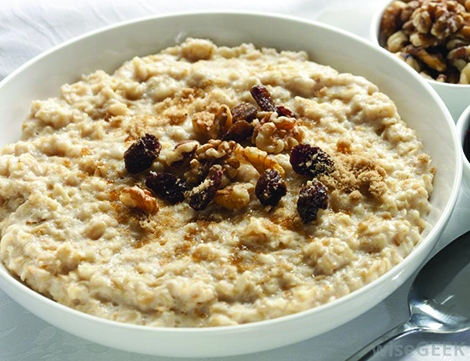
Cholesterol generally has a poor stigma. But unlike popular belief, the body needs cholesterol. The waxy substance is found in the body’s cells and is required to produce vital hormones along with vitamin D and bile.
Additionally, cholesterol can be further divided into “bad†and “good†cholesterol – “bad†cholesterol, known as low-density lipoprotein (LDL), contributes to plaque build-up on the artery walls, while “good†cholesterol, known as high-density lipoprotein (HDL), helps eliminate the “bad†cholesterol from the body.
The body functions optimally when cholesterol types are maintained within recommended amounts. However, balancing cholesterol is not as simple as discouraging cholesterol from dietary sources. Luckily, food that’s rich in fiber — specifically soluble fiber – or healthy fats is shown to reduce cholesterol. This type of fiber can be thought of as a sponge. When soluble fiber is ingested, it absorbs with water and forms a gel-like substance, ultimately having the ability to bind and excrete cholesterol from the body. Dietary fiber recommendations indicate at least 25 grams for women and 38 grams for men each day.
These 10 foods may lower cholesterol:
- Oats
Oats are notoriously known for their fiber content, as one cup of cooked oats supplies four grams of fiber, specifically two grams each of soluble and insoluble fibers.
- Beans
Also packed with protein, beans of all types offer significant amounts of soluble fiber.
- Apples
An apple a day may keep cholesterol levels at bay. Apples are rich sources of soluble fiber. Don’t skimp out of the peel, as it offers insoluble fiber shown to support digestive health.
- Strawberries
Strawberries not only supply soluble fiber, but also powerful antioxidants. Antioxidants reduce the risk of atherosclerosis, or hardening of the arteries, a disease in which plaque builds up inside vessel walls. The plaque is largely comprised of cholesterol and fatty substances, and if too much is present, a heart attack or stroke may result.
- Fatty fish
Omega-3 fatty acids show great worth when it comes to heart health, as they increase HDL cholesterol levels while reducing triglycerides (or fat in the blood). Mackerel, lake trout, herring, sardines, albacore tuna, salmon, and halibut are suggested to offer the highest levels of omega-3 fatty acids.
- Walnuts
Walnuts are filled with alpha-linolenic acid (ALA), a fat shown to convert to omega-3 fatty acids within the body. Consuming walnuts may reduce total cholesterol and triglyceride levels. Additional encouraged nuts include almonds, pecans, and pistachios. Since all nuts are rich in calories, stick to a serving size (an ounce or small handful of nuts).
- Vegetable oils
Vegetable oils supply “good†unsaturated fats, including monounsaturated (MUFAs) and polyunsaturated fatty acids (PUFAs). MUFAs and PUFAs improve cholesterol levels and include olive, canola, and sunflower oils.
- Avocadoes
Avocadoes are a unique fruit, as they offer healthful fat rather than being saturated in carbohydrate. Avocadoes have been shown to improve LDL or “bad†cholesterol levels.
- Whey protein
One of the two milk proteins, the other being casein, may offer more than muscle stimulation and synthesis. In fact, whey supplements can lower LDL and total cholesterol levels.
- Plant sterol or stanol-containing foods
Stanols and sterols are plant substances that block the absorption of cholesterol, particularly shown to reduce LDL cholesterol by up to 15 percent. Food commonly fortified with plant stanols and sterols includes orange juice, yogurt, and margarine. just be cautious of trans fats and hydrogenated oils.
Lowering cholesterol levels essentially translates to improved heart health. But doing so is not as simple as cutting out cholesterol-containing egg yolks, like once believed. Lowering total or “bad†cholesterol can be achieved through a healthful diet and foods, but increasing “good†cholesterol is a little trickier. However, partaking in regular physical activity, losing excess weight, and smoking cessation have all been shown to increase HDL cholesterol levels. Additionally, the American Heart Association recommends limiting saturated and trans fat levels to less than 7 and 1 percent of total daily calories, respectively, for improving overall cholesterol levels and reducing heart disease risk.
Source: Silver Cuisine by bistroMD